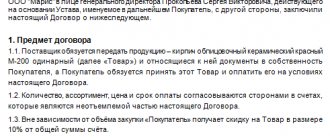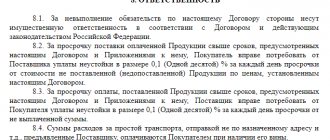How to return money for undelivered goods
What if the supplier, who received advance payment, did not deliver the goods within the time specified in the contract? the buyer has the right to demand (clause 3 of article 487 of the Civil Code of the Russian Federation):
- transfer of paid goods;
- return of funds paid.
In both cases, from the moment of expiration of the delivery period, the buyer can collect interest for the use of other people's funds under Art. 395 of the Civil Code of the Russian Federation, based on the size of the key rate established by the Bank of Russia. If the buyer is an individual, the penalty will be 0.5 percent of the advance payment amount for each day of delay (Clause 3, Article 23.1 of the Law “On Protection of Consumer Rights” dated 02/07/1992 No. 2300-1).
To return an item you need:
- submit a claim to the supplier; this is a mandatory step for legal entities and entrepreneurs (Part 5, Article 4 of the Arbitration Procedure Code of the Russian Federation). Individuals can submit a claim, but are not required to do so. If the contract provides for a mandatory claim procedure, the court may recognize such a condition as void, since Law No. 2300-1 does not provide for such a procedure (clause 11 of the Review of Judicial Practice in Cases of Protection of Consumer Rights, approved by the Presidium of the Supreme Court of the Russian Federation on October 14, 2020 );
- file a claim in court.
Next, we will dwell on each point in detail.
Results
Thus, the current civil legislation quite clearly defines the list of significant violations of the terms of the contract, in the event of which a bona fide party receives the right to terminate the agreement unilaterally.
In addition, the legislator provides for liability for various violations of the supply agreement, to which a party to the agreement that has not fulfilled its obligations may be held liable. You can find more complete information on the topic in ConsultantPlus. Free trial access to the system for 2 days.
How to write a complaint to a supplier for undelivered goods
There are no special requirements for the content of a claim in the law. In practice, the letter usually consists of an introductory and descriptive part, requirements for the supplier, a list of attachments and the signature of an authorized person.
The introductory part of the claim should indicate:
- addressee - that is, the person indicated in the contract as the supplier. It is necessary to list the name of the supplier, including its legal form, OGRN, INN, address given in the Unified State Register of Legal Entities, and contact telephone number. You can also register the postal address (if it is in the contract) or the email address of the addressee (if such a possibility is expressly provided for in the contract) (paragraphs 4, 5 of the “Review of the practice of application by arbitration courts of the provisions of procedural legislation on mandatory pre-trial dispute resolution”, approved by the Presidium Supreme Court of the Russian Federation 07/22/2020);
- your data (organizational and legal form, name, OGRN, INN, KPP, location address, contact phone number, email address);
- date and reference number of the claim.
In the descriptive part you must write:
- details of the supply agreement (date of conclusion, number);
- what is the violation of obligations by the supplier, indicating the clause of the contract and the rule of law. In our case – non-delivery of goods within the period established in the contract;
- evidence of violation (describe that an advance payment was made, but the goods were not delivered);
- as requirements to the supplier, it is necessary to inform: “We ask you to return the amount of the advance payment,” and also indicate the exact amount of money and the period within which the supplier must satisfy such requirements. In addition to the prepayment amount, you can demand payment of interest under Art. 395 of the Civil Code of the Russian Federation or penalties under clause 3 of Art. 23.1 of Law No. 2300-1.
We recommend that you attach copies of the following to your claim:
- supply agreements;
- documents that confirm the violation and justify your demands (papers confirming prepayment, calculations of penalties under clause 3 of Article 23.1 of Law No. 2300-1 or interest under Article 395 of the Civil Code of the Russian Federation).
The document should be sent to:
- specified in the contract as the exclusive address for sending legally significant messages (Article 165.1 of the Civil Code of the Russian Federation, paragraph 64 of the Resolution of the Plenum of the Supreme Court of the Russian Federation “On the application by courts of certain provisions of Section I of Part One of the Civil Code of the Russian Federation” dated June 23, 2015 No. 25);
- specified in the Unified State Register of Legal Entities, if the supplier is a legal entity. If the claim is delivered to this address, it is considered received, even if it is not located there (Clause 3, Article 54 of the Civil Code of the Russian Federation). If the counterparty is an individual entrepreneur, the document must be sent to the address reflected in the Unified State Register of Entrepreneurs. At the same time, sending a claim to another address specified in the contract will also indicate compliance with the claim procedure (clause 4 of the “Review of the practice of application by arbitration courts of the provisions of procedural legislation on the mandatory pre-trial procedure for resolving a dispute”, approved by the Presidium of the Supreme Court of the Russian Federation on July 22, 2020);
- to the counterparty’s email address, if the terms of the contract clearly and unambiguously allow the use of this method of sending a claim (clause 5 of the Review of Practice, approved by the Presidium of the RF Armed Forces on July 22, 2020).
You can send a claim in a way that is established by the contract as the exclusive method for sending legally significant messages. If this method is not specified, we recommend sending the documents:
- by mail by letter with the declared value and an inventory of the contents. Moreover, as a general rule, sending a pre-trial claim exclusively in this way is not necessary (clause 9 of the “Review of Practice”, approved by the Presidium of the RF Armed Forces on July 22, 2020), however, in practice, this will help to avoid disputes related to the content of the letter sent to the counterparty;
- by courier - under the signature of a person authorized by the counterparty to receive the person’s correspondence, for example, on a copy of a claim or in the register of shipments;
- by email - if such a possibility is clearly and unambiguously provided for in the contract.
It is necessary to keep all documents that confirm the fact of sending and delivery of the claim. For example, a postal receipt and a list of attachments when sent by mail, a delivery receipt, tracking information (for example, from the Russian Post website), a fax transmission report, or a printout of an email delivery notification. They will need to be attached to the claim to confirm compliance with the pre-trial claim procedure, if it is mandatory (clause 7, part 1, article 126 of the Arbitration Procedure Code of the Russian Federation).
If the statement of claim contains information about documents confirming compliance with the pre-trial procedure for resolving the dispute, but such documents are not presented, the court will leave the claim without progress (clause 13 of the Review of Practice, approved by the Presidium of the RF Armed Forces on July 22, 2020).
In addition, such documents may be needed if the counterparty does not respond to the claim or responds to it late. With their help, it is possible to prove that he violated the pre-trial procedure for resolving a dispute, which is provided for by law or contract. In this case, the court, regardless of the results of the consideration of the case, will assign all legal costs to the violator (Part 1 of Article 111 of the Arbitration Procedure Code of the Russian Federation).
Violation of delivery deadlines under 44 Federal Laws
After the procedure for concluding a supply agreement between the supplier and the customer is carried out, then they are subject to obligations to fulfill all the conditions of this document.
The contract itself specifies all obligations for the transfer of goods from the supplier to the buyer. If one of the parties to the contract fails to meet deadlines, then liability is assumed for this in accordance with the law. The liability involves imposing a fine or penalty, depending on the situation. The delivery period under the contract is established by agreement of the parties. In this case, it is necessary to clarify the delivery time and intermediate delivery dates for individual shipments, and the order of these conditions is also determined.
If the clauses of the agreement do not say anything about the terms, then it will not lose its force. But the deadlines will be calculated based on the principles of reasonableness. If you decide to take part in a bidding or auction, but you do not have the necessary experience, then our “Center” is ready to help you and provide comprehensive support for participating in turnkey bidding.
In different situations, disruption of the delivery of goods may be different:
Delay may be recognized as a violation, even if it occurs for 1 day; moreover, short delivery of the entire volume of goods may lead to
- bearing personal responsibility;
- sanctions will be imposed if there is a delay for each stage and for each delivery batch. But this condition will be met if these conditions were specified in the contract;
- in cases where goods of inadequate quality are supplied, sanctions cannot be imposed in this case, but the supplier will be responsible for the goods.
If the goods were intended for purchase in order to satisfy personal needs that will not relate to business activities, then a purchase and sale agreement is concluded. As for violations of obligations under the contract, in this case they will be similar to violations of the contract for the supply of goods.
Help from a lawyer
The law office “Katsailidi and Partners” is ready to provide qualified legal assistance to consumer rights throughout Russia.
In particular, we:
- We will advise you;
- We will prepare a legal position on your situation;
- we will prepare and send a claim to the seller;
- We interact with government agencies;
- we will draw up a statement of claim in defense of your rights in accordance with the law and judicial practice;
- We will represent your interests in court and protect them.
USEFUL : instructions on how to file a claim for consumer protection on our website via the link, also watch the video and ask your question to the lawyer in the comments
What is a supply agreement
Features of contractual relations related to supplies are described in Articles 506–534 of the Civil Code of the Russian Federation. The definition itself is given in Article 506. The contract reflects the seller’s obligations to transfer to the buyer inventory assets that the counterparty intends to use to conduct business. The goods supplied are not used to satisfy family or personal needs.
Since such an agreement is a type of purchase and sale contract, the rules given in Articles 454–491 of the Civil Code of the Russian Federation are applicable to it.
The contract provides for the shipment of one or more consignments of goods. There is no difference whether they are made by the manufacturer himself or purchased by him. The document reflects when and in what quantities consignments are shipped.
Responsibility of the parties to the transaction
Violations of the contract can be committed by both the supplier and the buyer. The list of significant deviations from the agreement is given in Article 523 of the Civil Code of the Russian Federation.
Violations and liability of the supplier
The supplier is liable if he:
- transferred goods with defects that cannot be corrected within a time acceptable to the buyer;
- repeatedly missed deadlines for the delivery of goods.
The reasons indicated in the list serve as grounds for terminating the contract. The moment of rupture is the receipt of a message in which the second party is informed of the counterparty’s decision to terminate the agreement.
Additionally, the party that committed the violation may be required to restore or compensate for the property losses of the injured counterparty.
The Civil Code of the Russian Federation is on the side of the company that suffered losses. Based on the provisions of the law, this party may demand:
- compensation for losses caused by the actions of the supplier, in accordance with paragraph 5 of Article 453 of the Civil Code;
- payment of interest on the amount of debt for the entire period of delay (Article 395 of the Civil Code);
- a fixed penalty, if such is specified in the concluded agreement (Article 521 of the Civil Code).
Violations and liability of the customer
The buyer is responsible for:
- repeated late payment;
- refusal to receive goods from the supplier’s warehouse if the violation occurred multiple times.
The responsibility of the customer is no different from that established for the supplier. It also includes the right of the seller to demand full payment of the amount of damages, late interest or penalties, if provided for in the agreement.
What is the delivery time for goods?
If the agreement or contract does not indicate the time period for the seller to fulfill his obligation, delivery is carried out within a “reasonable time”. The concept of a “reasonable period” is an estimate and is not directly established by law, but such a period must provide for:
- the distance that the seller or carrier must travel to present the goods to the consumer;
- force majeure circumstances (weather conditions, emergencies) and other situations beyond the will and actions of the seller of the goods or the carrier transporting the goods, making it difficult to deliver the goods;
- features of the rules for transporting certain types of goods;
- features of the rules of transportation by various modes of transport (train, plane, water vessel);
- features of international transportation.
Also, if delivery is made within one locality, it should not exceed three calendar days. The beginning of this period is determined by the moment of signing and payment by the consumer.
IMPORTANT: when the seller is clearly delaying the delivery of goods, and the consumer has made demands to fulfill the obligation to deliver the goods, the seller must deliver within 7 calendar days from the date of presentation (receipt) of such a demand.
The seller's obligations are considered fulfilled if he delivers the goods to the address specified in the agreement or contract of the parties. If the goods are presented on time, but were not actually received due to the fault of the consumer, then the seller is considered to have fulfilled his obligations, delivery can be carried out under a new agreement, at a different time, the delivery cost is paid again.
How to receive a penalty under Article 23.1 of the Civil Code?
First, you need to write a claim for payment of a penalty and delivery of prepaid goods / return of prepayment. You can use our free claim examples.
Sample claim - late delivery of a pre-paid car (transfer or refund of money, penalty) Sample claim - delay in delivery of a pre-paid product (transfer or refund of money, penalty)
The detailed procedure for receiving a penalty and returning the prepayment is described in our instructions: You have made an advance payment for the goods, the delivery time has passed, the goods are not being delivered, what should you do?
Penalty amount: how to calculate, formula
The amount of the penalty under the supply contract is fixed if it is determined in the form of a fine. Accordingly, no calculation is required.
How to calculate a penalty under a supply contract, defined as a penalty? This procedure is not established by law. If there is no special indication in the contract regarding the calculation procedure, the formula for calculating the penalty under the supply contract is as follows:
P = C × % × V,
Where:
- P - the amount of penalties to be satisfied;
- C - the amount of the overdue obligation (the amount of the overdue payment, the cost of undelivered goods);
- % - the amount of interest established by the parties for improper performance of the obligation;
- B - the period for which the sanction is accrued (days, weeks, months, etc.).
So, for example, if there is a delay in delivery of goods worth 10,000 rubles. within 1 month and a penalty of 10%, the amount of sanctions to be paid will be: 10,000 × 1 × 10% = 1000 rubles.







